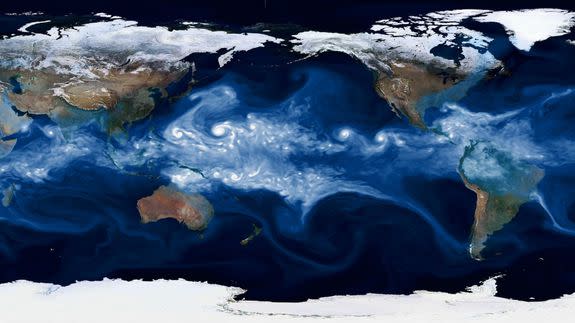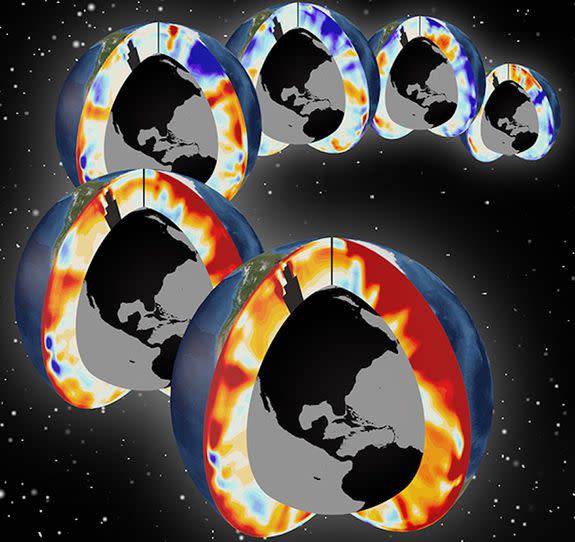Donald Trump's anti-climate science shakedown just started

The Trump transition team sent an unusually detailed questionnaire to the Energy Department, seeking, among other information, lists of people involved in climate change programs at one of the premier science agencies in the world.
The questionnaire, which was first reported by Bloomberg News and obtained independently by Mashable, asks for "a list of Department employees or contractors" who attended the U.N. climate talks in the past five years.
This raises fears that such employees could be retaliated against in some way, perhaps by being reassigned, despite worker protections they have as civil servants.
SEE ALSO: Trump's just-named EPA chief is a climate change denier
Along similar lines, the document seeks "a list of all Department of Energy employees or contractors who have attended any Interagency Working Group on the Social Cost of Carbon meetings."
The transition team — led by Thomas Pyle, the president of the free-market advocacy group American Energy Alliance that is heavily funded by the fossil fuel industry — is also seeking all materials produced in anticipation of, during and as a result of those meetings.
The cost of carbon
The social cost of carbon is the estimated cost to society of emitting a particular amount of planet-warming carbon dioxide into the atmosphere — in this case, one ton.
The social cost of carbon is a calculation that is central to government policy making through cost-benefit analysis, since it sets a price for the damages caused by emitting global warming pollution.
By putting a per-ton social cost of carbon in place, the Obama administration decided that fossil fuel burning has many economic downsides. Previous administrations had either not explored the social cost of carbon or calculated it as lower than the Obama administration did.
The Obama administration used the social cost of carbon to justify the enactment of rules to limit the burning of fossil fuels for energy, among other purposes. This calculation is central to the Clean Power Plan, which is the EPA's program to regulate greenhouse gas emissions from coal-fired power plants.
Scott Pruitt, the Trump administration's nominee to lead the EPA, has vowed to dismantle that plan. The Energy Department transition team is clearly taking aim at this as well.
“These are people who have been following government for a very long time and are taking advantage of Donald Trump to step in and try to dismantle what they see as a system of research that comes up with results that they won’t accept," said Michael Halpern, the deputy director of the Center for Science and Democracy at the Union of Concerned Scientists, in an interview.

Image: Department of energy/flickr
The questionnaire also asks about another extremely important, but largely obscure, calculation, which again indicates that officials are considering fundamental changes to the department's far-reaching climate change programs.
The document asks for the department's "opinion on the proper equilibrium climate sensitivity," which is a measure of how much global warming would occur with a doubling of greenhouse gases in the atmosphere. This is important since the agency uses that calculation in its modeling projections of future climate change.
The Energy Department is one of the top modeling centers of climate change in the world, with climate change research existing alongside nuclear weapons-related work at many of the agency's national laboratories.
The questionnaire also asks for a list of Energy Department programs that "are essential to meeting the goals of President Obama's Climate Action Plan." That plan aims to cut domestic greenhouse gas emissions by up to 28 percent below 2005 levels by 2020.
A coming administration hostile to climate science
The transition team's questionnaire, which reads more like a subpoena, also mentions the possibility of a 10 percent budget cut to the department starting in fiscal year 2018, and expresses skepticism about the Energy Information Administration's calculations about how much renewable energy is likely to be used in the coming years.
“The people who are running the transition at some of the science agencies are some of the people who have been most hostile to the missions of those agencies," Halpern said of the Trump administration transition effort.

Image: Timo Bremer/Lawrence Livermore National Laboratory via AP
He noted that the questionnaire is so intrusive that not all of the information requested is public, which means the department won't be able to fully answer all of the questions. Halpern also said it's possible that once an Energy Secretary is named and confirmed, climate science will be spared from a full onslaught at the agency, but that is not a safe bet.
Curiously, in the section dealing with the Energy Department's national laboratories, one question asks for a list of all websites "maintained by or contributed to by laboratory staff during work hours for the past three years."
It's unclear what that question is for, but it raises the possibility that websites dedicated to climate change, including data sets from Oak Ridge and Lawrence Livermore National Laboratories, could be taken offline. This would stifle climate research at nongovernmental entities in the U.S. and abroad.
"Scientific information provided by the government is critical to the work of university researchers, state governments, and countless others," Halpern said.
"During the Bush Administration, government scientific websites were altered or disappeared completely," he said.
He issued this warning based in part upon the questionnaire: "Anyone who relies on publicly available federal government research and information should take steps to ensure that they download what they need before the new administration steps in."
